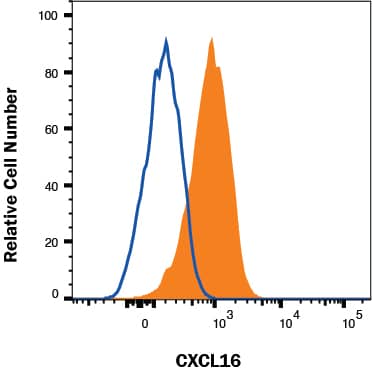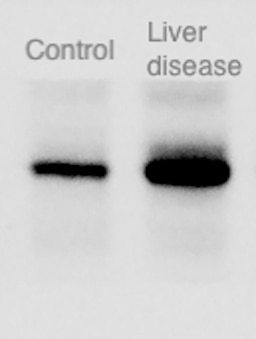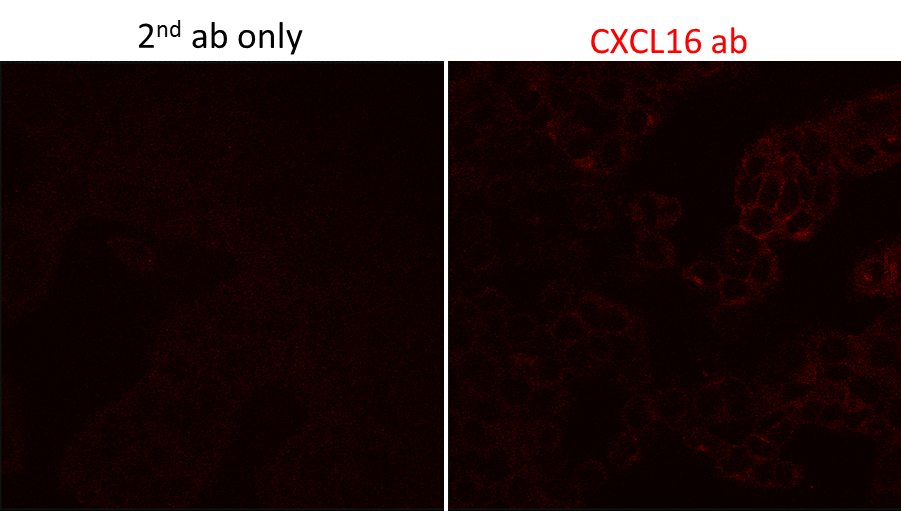Mouse CXCL16 Antibody Summary
Asn27-Pro114
Accession # Q8BSU2
*Small pack size (-SP) is supplied either lyophilized or as a 0.2 µm filtered solution in PBS.
Applications
Please Note: Optimal dilutions should be determined by each laboratory for each application. General Protocols are available in the Technical Information section on our website.
Scientific Data
 View Larger
View Larger
Detection of CXCL16 in Raw 264.7 cells by Flow Cytometry Raw 264.7 cells were stained with Goat Anti-Mouse CXCL16 Antigen Affinity-purified Polyclonal Antibody (Catalog # af503, filled histogram) or isotype control antibody (Catalog # AB-108-C, open histogram) followed by Allophycocyanin-conjugated Anti-Goat IgG Secondary Antibody (Catalog # F0108). View our protocol for Staining Membrane-associated Proteins.
 View Larger
View Larger
Chemotaxis Induced by CXCL16 and Neutralization by Mouse CXCL16 Antibody. Recombinant Mouse CXCL16 Chemokine Domain (Catalog # 503-CX) chemoattracts the BaF3 mouse pro‑B cell line transfected with mouse CXCR6 in a dose-dependent manner (orange line). The amount of cells that migrated through to the lower chemotaxis chamber was measured by Resazurin (Catalog # AR002). Chemotaxis elicited by Recombinant Mouse CXCL16 Chemokine Domain (7.5 ng/mL) is neutralized (green line) by increasing concentrations of Goat Anti-Mouse CXCL16 Antigen Affinity-purified Polyclonal Antibody (Catalog # AF503). The ND50 is typically 0.1-0.4 µg/mL.
Preparation and Storage
- 12 months from date of receipt, -20 to -70 °C as supplied.
- 1 month, 2 to 8 °C under sterile conditions after reconstitution.
- 6 months, -20 to -70 °C under sterile conditions after reconstitution.
Background: CXCL16
Mouse CXCL16 (CXC chemokine 16) is a non-ELR motif-containing CXC chemokine with a transmembrane domain. CX3CL1/Fractalkine and CXCL16 are the only two transmembrane chemokines within the superfamily. Mouse CXCL16 cDNA encodes a 246 amino acid (aa) precursor protein with a putative 26 aa residue signal peptide, an 88 aa residue chemokine domain, an 87 aa residue mucin-like spacer region, a 22 aa residue transmembrane domain, and a 23 aa residue cytoplasmic tail. Mouse and human CXCL16 share 49% overall aa identity and 70% similarity in the chemokine domains. Mouse CXCL16 is produced by dendritic cells in lymphoid organ T cell zones and by cells in the splenic red pulp both as membrane-bound and soluble forms. Based on northern blot analysis, CXCL16 is also expressed in some nonlymphoid tissues such as lung, small intestine and kidney. The receptor for CXCL16 has been identified as CXCR6/Bonzo (STRL33 and TYMSTR), a receptor previously shown to be a co-receptor for HIV entry. CXCR6 is expressed on naive CD8 cells, natural killer T cells and activated CD8 and CD4 T cells.
Product Datasheets
Citations for Mouse CXCL16 Antibody
R&D Systems personnel manually curate a database that contains references using R&D Systems products. The data collected includes not only links to publications in PubMed, but also provides information about sample types, species, and experimental conditions.
15
Citations: Showing 1 - 10
Filter your results:
Filter by:
-
CXCR6 is required for antitumor efficacy of intratumoral CD8+ T cell
Authors: Binglin Wang, Yi Wang, Xiaofan Sun, Guoliang Deng, Wei Huang, Xingxin Wu et al.
Journal for ImmunoTherapy of Cancer
-
Trasmembrane chemokines CX3CL1 and CXCL16 drive interplay between neurons, microglia and astrocytes to counteract pMCAO and excitotoxic neuronal death
Authors: Maria Rosito, Clotilde Lauro, Giuseppina Chece, Alessandra Porzia, Lucia Monaco, Fabrizio Mainiero et al.
Frontiers in Cellular Neuroscience
-
Leishmania donovani lipophosphoglycan increases macrophage-dependent chemotaxis of CXCR6-expressing cells via CXCL16 induction
Authors: V Chaparro, LP Leroux, A Zimmermann, A Jardim, B Johnston, A Descoteaux, M Jaramillo
Infect. Immun., 2019-04-23;0(0):.
-
Toxoplasma gondii infection induces the expression of the chemokine CXCL16 in macrophages to promote chemoattraction of CXCR6+ cells
Authors: Leroux, L-P;Chaparro, V;Plouffe, A;Johnston, B;Jaramillo, M;
Infection and immunity
Species: Mouse
Sample Types: Cell Culture Supernates, Cell Lysates, Transfected Whole Cells
Applications: Flow Cytometry, Western Blot, Neutralization -
CXCL16 exacerbates Pseudomonas aeruginosa keratitis by promoting neutrophil activation
Authors: Wu, J;Wang, W;Yuan, F;Zheng, J;Zhang, W;Guo, H;Wang, L;Dai, C;Han, F;Wu, X;Gao, J;
International immunopharmacology
Species: Mouse
Sample Types: In Vivo
Applications: In vivo assay -
Chemotherapy-induced tumor immunogenicity is mediated in part by megakaryocyte-erythroid progenitors
Authors: A Vorontsova, TJ Cooper, J Haj-Shomal, M Benguigui, S Levin, B Manobla, R Menachem, M Timaner, Z Raviv, Y Shaked
Oncogene, 2023-01-16;0(0):.
Species: Mouse
Sample Types: Whole Cells
Applications: Neutralization -
Distinct hepatic immunological patterns are associated with the progression or inhibition of hepatocellular carcinoma
Authors: F Mirshahi, HF Aqbi, M Isbell, SH Manjili, C Guo, M Saneshaw, M Dozmorov, A Khosla, K Wack, OM Carrasco-Z, MO Idowu, XY Wang, AJ Sanyal, MH Manjili, D Bandyopadh
Cell Reports, 2022-03-01;38(9):110454.
Species: Mouse
Sample Types: Whole Tissue
Applications: IHC -
IL-33 modulates inflammatory brain injury but exacerbates systemic immunosuppression following ischemic stroke
Authors: SR Zhang, M Piepke, HX Chu, BR Broughton, R Shim, CH Wong, S Lee, MA Evans, A Vinh, S Sakkal, TV Arumugam, T Magnus, S Huber, M Gelderblom, GR Drummond, CG Sobey, HA Kim
JCI Insight, 2018-09-20;3(18):.
Species: Mouse
Sample Types: Whole Tissue
Applications: IHC -
Comprehensive assessment of chemokine expression profiles by flow cytometry.
Authors: Eberlein J, Nguyen TT, Victorino F, Golden-Mason L, Rosen HR, Homann D
J. Clin. Invest., 2010-02-08;120(3):907-23.
Species: Mouse
Sample Types: Whole Cells
Applications: Flow Cytometry -
Elevated urinary VCAM-1, P-selectin, soluble TNF receptor-1, and CXC chemokine ligand 16 in multiple murine lupus strains and human lupus nephritis.
Authors: Wu T, Xie C, Wang HW, Zhou XJ, Schwartz N, Calixto S, Mackay M, Aranow C, Putterman C, Mohan C
J. Immunol., 2007-11-15;179(10):7166-75.
Species: Mouse
Sample Types: Whole Tissue
Applications: IHC -
Excreted urinary mediators in an animal model of experimental immune nephritis with potential pathogenic significance.
Authors: Wu T, Xie C, Bhaskarabhatla M, Yan M, Leone A, Chen SS, Zhou XJ, Putterman C, Mohan C
Arthritis Rheum., 2007-03-01;56(3):949-59.
Species: Mouse
Sample Types: Whole Tissue
Applications: IHC -
Intervention of MAdCAM-1 or fractalkine alleviates graft-versus-host reaction associated intestinal injury while preserving graft-versus-tumor effects.
Authors: Ueha S, Murai M, Yoneyama H, Kitabatake M, Imai T, Shimaoka T, Yonehara S, Ishikawa S, Matsushima K
J. Leukoc. Biol., 2006-10-19;81(1):176-85.
Species: Mouse
Sample Types: Whole Tissue
Applications: IHC -
Inhibition of angiogenesis by interleukin-4 gene therapy in rat adjuvant-induced arthritis.
Authors: Haas CS, Amin MA, Allen BB, Ruth JH, Haines GK, Woods JM, Koch AE
Arthritis Rheum., 2006-08-01;54(8):2402-14.
Species: Rat
Sample Types: Tissue Homogenates
Applications: Neutralization -
CXCL16 orchestrates adenosine A3 receptor and MCP-1/CCL2 activity to protect neurons from excitotoxic cell death in the CNS
Authors: Maria Rosito, Cristina Deflorio, Cristina Limatola, Flavia Trettel
The Journal of Neuroscience
-
Pharmacological inhibition of FGFR modulates the metastatic immune microenvironment and promotes response to immune checkpoint blockade
Authors: Saeed S. Akhand, Zian Liu, Stephen C. Purdy, Ammara Abdullah, Hang Lin, Gregory M. Cresswell et al.
Cancer Immunology Research
FAQs
No product specific FAQs exist for this product, however you may
View all Antibody FAQsReviews for Mouse CXCL16 Antibody
Average Rating: 5 (Based on 2 Reviews)
Have you used Mouse CXCL16 Antibody?
Submit a review and receive an Amazon gift card.
$25/€18/£15/$25CAN/¥75 Yuan/¥2500 Yen for a review with an image
$10/€7/£6/$10 CAD/¥70 Yuan/¥1110 Yen for a review without an image
Filter by:
Western blot of liver tissue from a animal model of inflammatory liver disease shows increased expression of CXCL16 protein (RIGHT), relative to control mice (LEFT).



